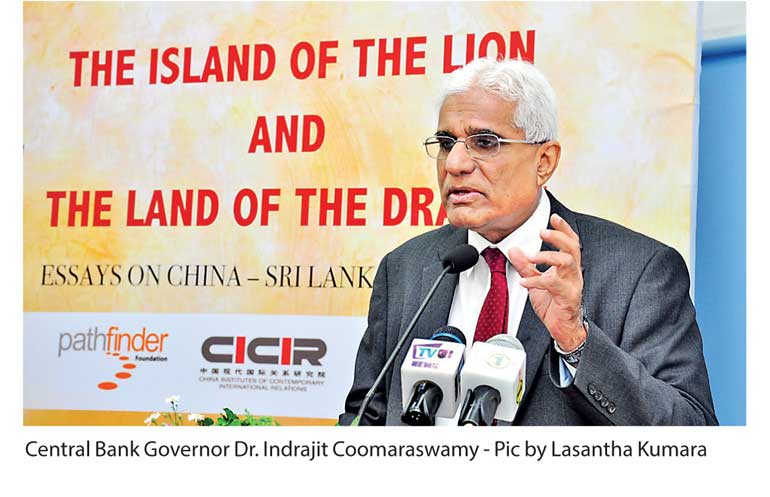Saturday Feb 21, 2026
Saturday Feb 21, 2026
Wednesday, 17 January 2018 00:05 - - {{hitsCtrl.values.hits}}

By Shannon Jayawardena
Stronger economic relations with China, underpinned by a pending Free Trade Agreement (FTA), should be given the highest priority by Sri Lanka as it provided the best opportunity to attract trade investments and implement important structural transformations in the economy, Central Bank Governor Dr. Indrajit Coomaraswamy said yesterday.
Speaking at the launch of the essay book ‘The Island of the Lion and the Land of the Dragon’, Dr. Coomaraswamy said that relations with China must always be given the highest priority.
“No other country offers anything as much in terms of capital which is able to be deployed from China. In addition to that, China has been a longstanding and steady friend of this country. Having said that, relations with China must always be given the highest right,” he told the gathering.
Dr. Coomaraswamy, emphasising the theme ‘Promoting Chinese Investments in Sri Lanka: A Way Forward’, stated: “This book is a reflection of the major role that the countries have in promoting bilateral relations between Sri Lanka and China. China has always been an outstanding, durable and friendly nation with Sri Lanka.”
The book is a series of essays that denote China-Sri Lanka relations, including the challenges and opportunities the two countries are faced with. The essays compromise both Lankan and Chinese viewpoints on issues and debates including Sino-Lankan history, economic partnership and the Belt and Road Initiative.
“As we all know China has had a major role in the development of this country in recent years and if we look around the Colombo landscape we see a number of constructions which have been generous gifts of the Chinese government, which include the BMICH, the Supreme Court Complex, Nelum Pokuna and the Lotus Tower. These are landmarks of China’s friendship with Sri Lanka and shows the steadfast support in Sri Lanka’s development,” said Coomaraswamy.
“While Sri Lanka has enjoyed many benefits through this bilateral relationship, I think the future is even brighter and of course the Maritime Silk Route can provide the framework for the strengthening of these bilateral relations.”
Dr. Coomaraswamy noted that “the jewel in the crown” would be the Free Trade Agreement (FTA) under negotiation that allows the two countries to move beyond trade to enable investment in technology and training. The FTA has the potential to not only increase market access to Sri Lankan exports to China but can also have a transformative impact on investment and technology in Sri Lanka, he observed.
The Governor pointed out several sectors in which Sri Lankan exports could benefit, including high-value apparel, tea, coconut and rubber products. He stated that even though these sectors could increase supply through an FTA with China, the primary focus should remain on trade investments to boost Sri Lanka’s economy. Chinese investments could also encourage structural changes within Sri Lanka’s economy, including much-needed labour reform where large numbers of workers in agriculture and other underproductive sectors could filter into better paying industries and services sector jobs, he stressed.
“All of this together can hopefully make a very strong investment case for Chinese businesses to come to Sri Lanka. On our side, we need to make sure that we create a propitious investment plan for Chinese businesses. We need to find the land which they require to set up the industry and the human workforce. There is a general perception that there is a labour shortage in Sri Lanka simply because some of the expanding industries have difficulties in hiring labour. In my view the problem is not that there is a shortage of labour but we have far too much labour in the wrong places.”
“I think this fear that we don’t have the labour to work is a problem and we need to shift this low productive labour into more productive areas. I heard that Chinese enterprises can create jobs in their industries to pay about $ 500 a month. If that is possible then this whole incentive structure changes.”
Global changes as well as a shift in China’s internal economy gives the opportunity for an increase in investment into Sri Lanka where attractive investment options provide space for China to increase consumption and maintain stronger relations with South Asia.